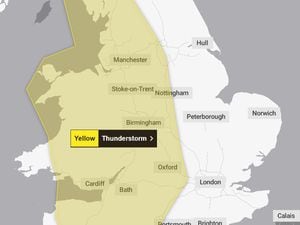Pollinators will feel the bee's knees on their new beaches
Winter might be here but work is underway across Walsall to ensure next summer the borough's pollinators will feel the bee's knees.

Walsall Council is restoring historic eight heathland habitats to create bee ‘beaches’ to support the threatened tormentil mining bee and other pollinators.
The sites, spanning from Sutton Park to Cannock Chase in Staffordshire are part of the Purple Horizons Nature Recovery Project, coordinated by Natural England in collaboration with local councils and nature organisations.
The project, which takes its name from the purple heather which covers much of the heathland areas, aims to connect green spaces to allow the area’s reptiles, birds, and pollinators to move and thrive, which is crucial for the future climate-resilience of local species.
Diggers will be removing vegetation from the sites in Walsall and Lichfield, which are all remnants of a vast heathland landscape. The freshly dug earth will make space for bees and wasps to nest and provide suitable habitat for a range of species that use heathlands, such as common lizards.
One such threatened species is the tormentil mining bee which was once thought to be locally extinct but was rediscovered at Chasewater in 2022 and Brownhills Common this year.
The tormentil mining bee, which is listed as a Priority Species in England, digs nesting burrows in soft soil banks or ‘beaches’. They feed their young almost exclusively on the pollen of tormentil, a rare wildflower that grows on acidic sandy soils.
The team, who include the Birmingham and Black Country Wildlife Trust and Walsall conservation volunteers, are encouraging a greater abundance of tormentil flowers by propagating plants from locally collected seed and cuttings, ready for planting out in the spring.
Aaron Bhambra, a PhD Student at the University of Birmingham, is monitoring the populations of bees and wildflowers and taking drone images of the sites.

He said: “We have a real opportunity here to try and help save the tormentil mining bee from becoming extinct in Britain. Although the bee beaches we create will be quite a stark contrast to the surrounding grass and heathland initially, over time the patches of bare earth will allow the heathland to re-establish itself to its former glory.”
Nationally, around 80 per cent of heathlands have been lost since 1800 and globally the habitat is rarer than a tropical rainforest. Historically, cattle grazing helped to keep the spaces open and free from overgrowth but as the use of these landscapes changed over time, they have become overpopulated with trees and shrubs. This has led to a decline in the availability of natural heathland spaces which are crucial for the survival of certain rare plants and insects.
Councillor Gary Flint, Portfolio Holder for Wellbeing, Leisure, and Public Spaces at Walsall Council, said: “The Purple Horizons project offers our residents and community members the chance to reconnect with and move through the wonderful natural environments that are right on their doorstep. People’s mental and physical health can benefit hugely by spending time in these beautiful natural spaces.”
Emma Johnson, Area Manager for Natural England in the West Midlands, added: “This is all about recreating and restoring nature rich places which will make a big difference to endangered species such as the mining bee. Having more nature rich places in Walsall and Lichfield is great for us, vibrant green spaces to enjoy which will also help reduce the effects of climate change."
Walsall Council is working with the Canal & River Trust, Lichfield Council and Staffordshire County Council to deliver the works which will take around two weeks.





